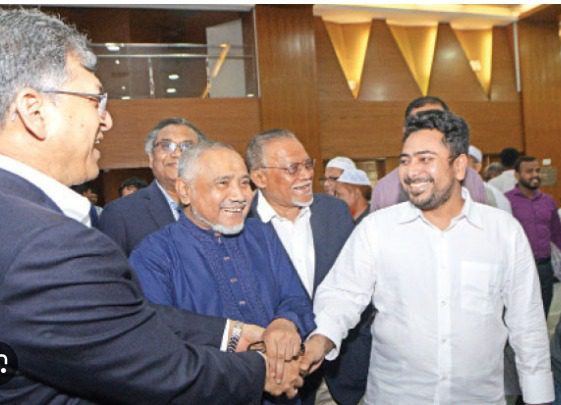BNP Standing Committee member Salahuddin Ahmed has ruled out any possibility of forming an electoral alliance with long-time ally Bangladesh Jamaat-e-Islami, while keeping the door open for discussions with the National Citizen Party (NCP) until the announcement of the next election schedule.
In an interview, Salahuddin reiterated the party’s commitment to forming a national government with those who participated in the simultaneous anti-government movement. “We had an alliance with Jamaat as a political strategy in the past, but we don’t feel the need to partner with them this time,” he said.
However, the BNP leader left room for negotiation with other parties. “Discussions on political alliances will continue until the election schedule is announced. We’ll have to wait and see what happens,” he noted, referring to NCP.
Salahuddin expressed optimism that the upcoming national election would be held by mid-February 2026. He said the demands being raised by different political parties are part of broader electoral strategies rather than fundamental disagreements on timelines.
He also urged the National Consensus Commission to complete its discussions on reform proposals without unnecessary delays. “I think the discussion is being unnecessarily prolonged. In my opinion, it should have been concluded within a reasonable timeframe,” he remarked, criticising the current pace of meetings.
On the evolving structure of the caretaker government, Salahuddin said, “The caretaker system has almost been restored — only the Supreme Court’s review is pending. We hope the Appellate Division will deliver a positive verdict.” He acknowledged that debate continues over whether the immediate past Chief Justice should serve as Chief Adviser.
He noted that both his party and others would submit proposals to the Reform Commission. “If no better option is agreed upon, the current structure will remain,” he added.
Salahuddin firmly rejected any move to introduce a Proportional Representation (PR) system in the upcoming polls. “Bangladesh’s political and social landscape is not suitable for PR,” he said, arguing that such a system could disconnect voters from directly choosing their representatives and reduce accountability.
“In PR, someone from outside a voter’s locality might be selected despite people voting for someone else. That’s not democracy — that’s detachment,” he said, adding that PR would also disadvantage independent candidates and favour minor parties with limited support, leading to unstable coalition governments.
He further explained that in countries where PR works, local governments are stronger. “But here, MPs are directly involved in development work. PR will only undermine the electoral process,” he warned.
Salahuddin, who represents BNP in talks with the Consensus Commission, said the party would not accept the PR system under any circumstances. “Some parties are making various demands — reforms, justice, or proportional representation — but many of these remarks are driven by political motives,” he said.
He dismissed the weight of smaller parties pushing for PR. “Real political strength comes from public support. Some small parties speak louder than larger ones, but they represent very few people,” he said.
Even within BNP’s alliance, Salahuddin acknowledged that disagreements may arise, particularly over seat-sharing. “That’s part of the political bargaining process,” he said.
On the broader political situation, he maintained a scathing critique of the ruling Awami League. “My view is that the Awami League is no longer a political party. They lost their ideals and character long ago. Today, they are a mafia-like force — undemocratic and fascist,” he alleged. “Throughout their history, democracy was never in their DNA.”
Salahuddin also welcomed Nobel laureate Muhammad Yunus’ recent directive to the Election Commission to complete preparations for the polls, saying it was a positive step towards restoring public confidence in the electoral process.


